UNSUNG HEROES
ECU workers prepare campus for the Return of Pirate Nation
As the Return of Pirate Nation began, some staff at East Carolina University never left and paved the way for students and faculty to get back to campus.
ECU Facilities Services had three major projects to prepare for the return, including the fabrication of about 500 stands for sanitizing wipes that will be used to clean surfaces in classrooms and labs.
“Supply and demand didn’t match up,” said Ricky Hill, director of facilities services. “Materials management was not able to find or get supplies in time for the wipe stands, so we made the decision to put those together ourselves. We agreed on a prototype and then purchased all the materials to actually make the stands.”
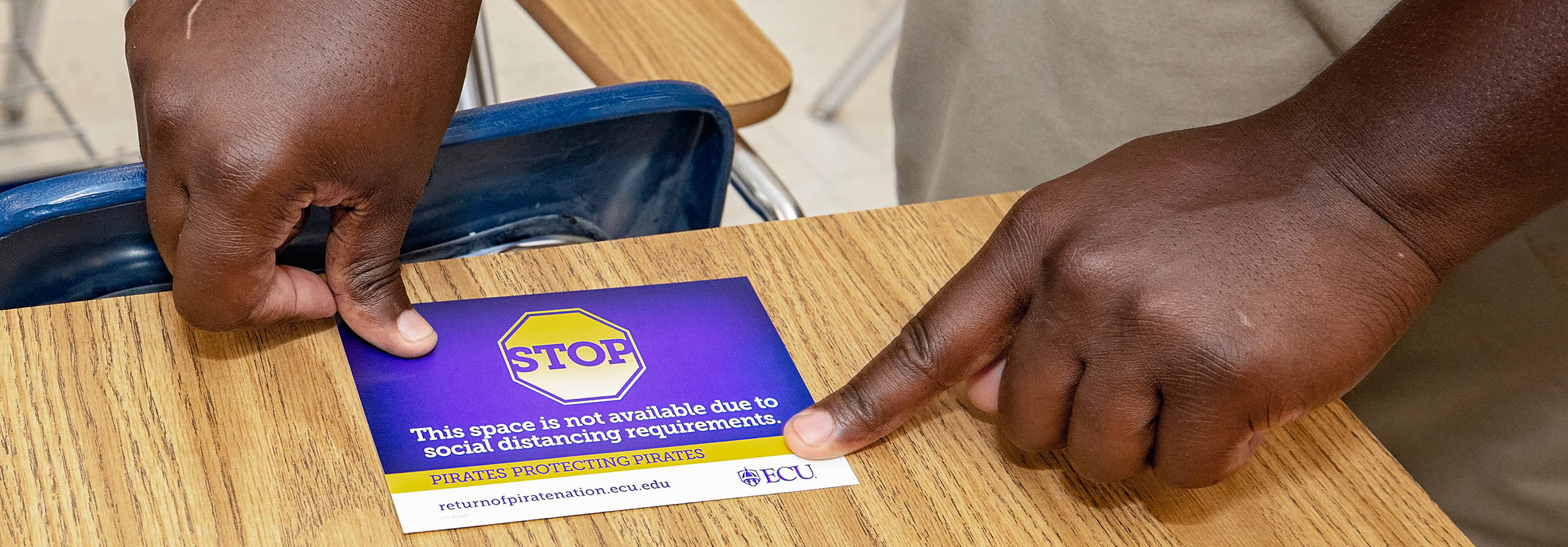
Marcel Riddick puts stickers on desks in Austin to ensure students are spaced properly in class. (Photo by Cliff Hollis)
Workers in the ECU carpentry shop used PVC components to fabricate the stands. ECU housekeepers assembled the containers consisting of dry wipes with disinfecting solution added in a gallon-sized bucket. Moving services personnel assembled the wipe stands and delivered the containers for placement into classrooms and class labs.
Facilities services also handled the placement of thousands of safety signs and labels around campus and the placement of about 150 hand sanitizing stations in high-traffic areas of academic and administrative buildings on campus.
Every department on campus had workers take special steps to prepare campus for the fall semester.

Nedra Harris sits at the front desk in the Brody Outpatient Center to screen patients as they enter the center. (Photo by Cliff Hollis)
Nedra Harris, Brody School of Medicine
Harris has been a fixture at the Brody School of Medicine for more than a quarter century.
She worked in mail services for 10 years, but for the past 18, Harris has been stationed in a glass booth at the entrance to the medical school, providing assistance for countless patients, visitors, students and staff.
But when access to the school was restricted due to the novel coronavirus, Harris agreed to step outside the safe confines of her booth to help screen patients for COVID-19 symptoms at the entrance to the ECU Physicians Brody Outpatient Center.
Since June, Harris has spent every day in the clinic — asking patients a series of questions to determine if they have been exposed to COVID-19 or if they have related symptoms.
“I was not afraid,” she said. “I like customer service work and I was eager to help out with the pandemic. I knew that if I took precautions, that I would be safe. And it does feel good to be able to help.”
Dr. Mark Stacy, dean of the Brody School of Medicine and vice chancellor for ECU’s Division of Health Sciences, said Harris is one of many examples of how staff across the division worked outside of their typical job descriptions during the pandemic to serve where they were needed most.
“The collective challenges of the past several months have required us all to do more with less,” Stacy said. “But thanks to Pirates like Nedra, this division has been able to continue meeting its mission to serve the people of eastern North Carolina — and do so safely.”
Dr. LaNika Wright, Student Health Services
On the frontlines during the pandemic, personnel at Student Health Services (SHS) have been adapting to ever-changing information and procedures from local, state and national health officials.
“One of the greatest challenges has been ensuring we are providing up-to-date and current information to our students, and also making sure we have the time and resources to provide quality care,” said Wright, SHS director.
Wright helped create and update policies and protocols in preparation for the Return of Pirate Nation, while also planning for new ways to help keep students healthy.
“SHS has restructured our schedule and workflow to ensure we can keep our patients safe and provide quality care,” Wright said. “We added telehealth for some appointments and drive-thru testing to meet the needs of the students.”
It’s all just par for the course for those in SHS.
“We are happy to help in any way we can to help move the university forward,” Wright said.

Certified Medical Assistant Terrence Gaynor talks to a driver before administering a COVID-19 test at an ECU Physicians mobile site. (Photos by Cliff Hollis)
ECU Physicians team exemplifies service
In the heat of a summer afternoon, a team of ECU Physicians health-care providers comes together as a well-oiled machine, providing COVID-19 testing at a safe and efficient outdoor site.
The team takes its responsibility seriously; each member barely stops moving during testing hours. ECU Physicians leaders say the testing team has gone above and beyond in service to patients and the community.
“Jennifer and her team have been our premier resource for COVID-19 testing,” said ECU Physicians Chief Medical Officer Dr. Jason Foltz. “It just highlights the dedication that our staff has to continue our core purpose—to provide the highest quality, most comprehensive care to our patients. This pandemic has allowed that to come through. At the end of the day, all that matters is that we do the right thing.”
The team, led by Jennifer Blizzard, nurse administrator in the Department of Family Medicine, performs coronavirus testing as patients drive through the site. In place since the early weeks of the pandemic, the site provides testing to ECU Physicians patients. While it’s available to community members as well, a testing order is required through the practice’s community COVID line at 744-1111.
At the testing site, certified medical assistants move from car to car, managing to perform tests while also putting patients at ease—even as they anticipate test results.

Jennifer Blizzard, nurse administrator in the Department of Family Medicine, works at the ECU Physicians COVID-19 testing site. (Photo by Cliff Hollis)
“It has been really impressive to see,” said Martha Dartt, chief nurse executive for ECU Physicians. “We’re really proud.”
The testing site is a tangible result of collaboration; a variety of people and offices have contributed to making the service available to those who need testing. ECU Police, ECU Pathology, Facilities, Parking and Transportation, Financial Services and ITCS as well as Vidant Health have all helped make it work—Facilities even dismantled the site as Hurricane Isaias approached, reassembling in record time after the storm passed.
Foltz said that those at the testing site are running the service even though they also have other duties, allowing other ECU Physicians providers and employees to go above and beyond as well for the sake of community health and safety.
“While the testing team has been a shining star, other heroes have stepped up,” he said. “It has highlighted the collaboration with all the people on campus who recognize the need.”
Even while running the testing site with the precision of a machine, Blizzard said the team operates so smoothly for one reason: the human element.
“This is the career we chose to serve and care for others,” Blizzard said. “Putting the patients first and making sure their needs are met is what matters the most. I could not be more proud of my team and the dedication they have had to not only for the ECU patients, but the entire community.”
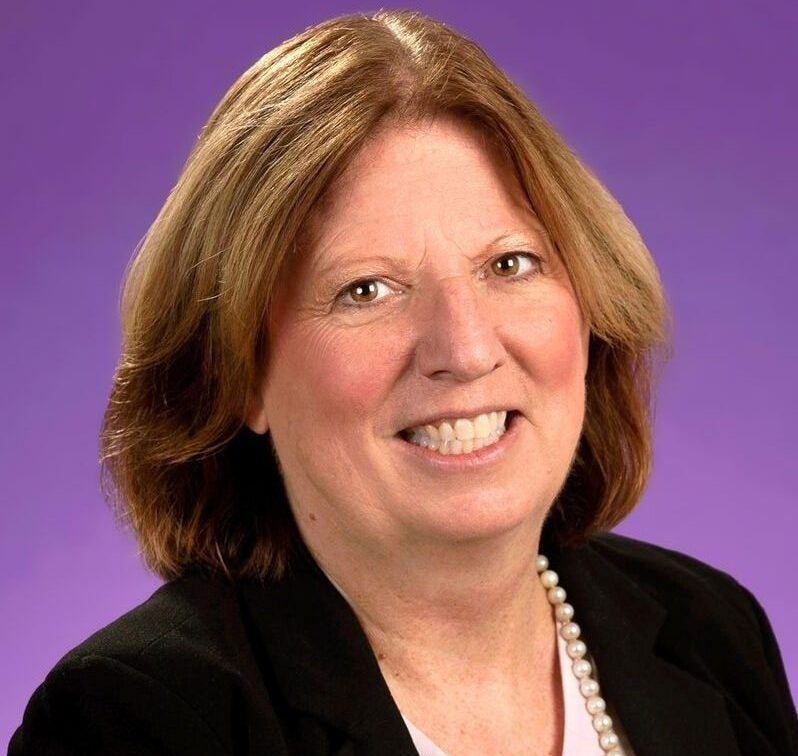
Karen Kus is executive director of the Center for Student Success in the College of Business. (File)
Karen Kus, College of Business
As the executive director of the Center for Student Success, Kus was tasked with helping new and transfer students make a smooth transition to college while helping everyone adjust to the new block scheduling and virtual classes.
“My feeling is that we are all in this together and we will all need to continue to work together to get through these challenging times,” Kus said. “I consider it a privilege to be able to work in an environment that focuses on student success, public service and regional transformation — which will be even more important post-COVID-19. The ECU family is incredibly strong, and we will continue to focus on what we value most — our students, our faculty and our staff — and we’ll get through this.”
The college created a video to reassure students and has been planning virtual career fairs, and Kus said administrative staff and IT personnel have played a major role in keeping the college operational during the pandemic.
“I’m very grateful to be connected with such an amazing group of people,” Kus said.
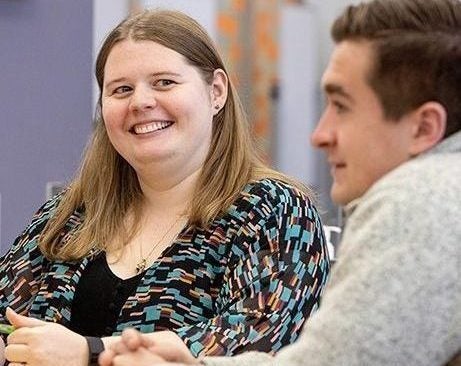
Amber Arnold, assistant director of student success in the Pirate Academic Success Center, smiles as she listens to student Noland McDonald during a session last year. (Photo taken pre-COVID-19 by Rhett Butler)
Amber Arnold, Pirate Academic Success Center
Arnold said staying connected to current students while building relationships with new ones has been crucial in preparation for the fall.
“We rely on our ‘open door policy’ where students can stop by whenever just to talk, get advice, and know that someone cares about them,” said Arnold, assistant director for student success at the center. “Now that we are teleworking, we have to be intentional in our efforts to remain present for them.”
Arnold and her team helped create an online Canvas course to help incoming freshmen adjust to online learning, while organizing Facebook Live and Microsoft Teams sessions. They also maintained contact with current students, offering online appointments and tutoring.
“Engaging with students during this unique time is even more important than ever before,” said Arnold. “While it is always our goal to reach students at the point of their need and stay connected with them, during this time of social distancing, isolation and quarantine, the level of engagement with students becomes even more critical. It is important to reach out often to check on them — not only to do an academic check-in, but also to make sure that things are going OK in the rest of their life. Knowing that someone on campus truly cares about them, their health and safety, as well as their academic success, can make a huge difference in a student’s life.”
Conley Evans, College of Nursing
As the interim director of IT at the College of Nursing, Evans had the task of keeping the students, faculty and staff connected from remote locations.
“When we are all on site, there is a robust internet, but now we are trying to help end users, our faculty and staff, who live all over eastern North Carolina and all have varying degrees of internet connection speeds,” Evans said.
He said the IT team used Microsoft Teams and other similar programs to stay connected with college personnel, with up-to-date infrastructure allowing the team to provide quality support to remote users.
“I have been in IT for around 15 years, and I couldn’t imagine doing this in 2005,” Evans said. “There wasn’t the infrastructure to make it feasible.”
He said the IT team is committed to the college’s mission and its faculty and staff.
“We are a service industry,” Evans said. “Our job is to facilitate the rest of the college doing their jobs. And we are both proud and honored to do so.”

Dr. Diane Majewski is shown at the Honors College welcome tent as she greets incoming freshmen on Aug. 6. (Contributed photo)
Dr. Diane Majewski, Honors College
Maintaining a sense of community and engaging students are more important than ever for Majewski, the Honors College director of programming and special projects.
“Students come here knowing that they’re going to be a person and not a number,” she said.
Majewski began working on building that sense of community this summer with a program called HCTV, the college’s virtual orientation that lasted two months until freshmen moved into Gateway Residence Hall on Aug. 6.
“We’ve had to completely redesign everything that we do, and we’ve had to take a look at where is there value in something that’s virtual,” Majewski said. “It needs to be more than just a Zoom meeting. Can we take something that’s bland and dry information and turn it into a game that makes it interesting and fun and creative?”
Her team will continue virtual programming throughout the semester with a spotlight on the mentor program in Gateway. Returning students were assigned a small number of incoming freshmen to mentor throughout the academic year.
“It is the one way that students can connect and engage with one another, because they’re not going to be able to jump into groups or be a part of clubs,” Majewski said.
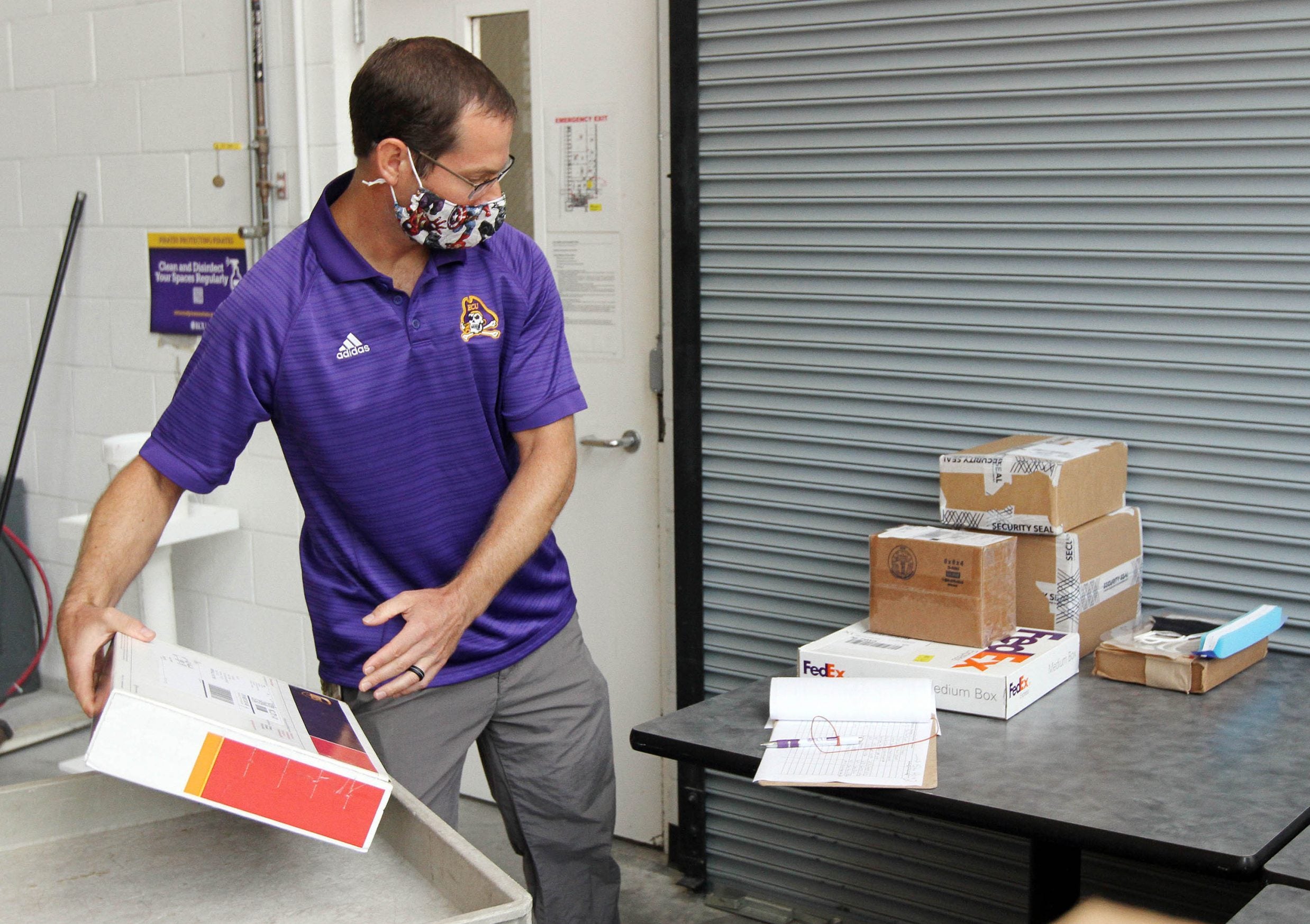
Josh Pitzer, interim director of lab operations for the College of Engineering and Technology, sorts packages in the Science and Technology Building.
(Photo by Ken Buday)
Josh Pitzer, College of Engineering and Technology
Neither snow nor rain nor heat nor pandemic kept Pitzer from his appointed rounds.
With so many faculty teleworking, Pitzer became the unofficial mailman of the College of Engineering and Technology, picking up, logging and keeping track of more than 500 packages delivered to faculty and others so they could be prepared for the start of the fall semester.
Some days the back of his pickup truck would be loaded with packages, while other days he operated a forklift to unload freight deliveries from larger trucks.
“It was nice knowing I had a role to play, and it made me feel good knowing that it was needed,” said Pitzer, the interim director of lab operations for the college.
Pitzer worked with ECU and private company personnel in the Innovation Design Lab to help produce face shields. Married to a doctor and with previous experience in biosafety, he was a perfect fit to serve on the college’s Reopening Task Force.
“Having the biosafety background and having my wife be a doctor, I knew enough to help explain some of the nuances of infection control and prevention, so that was helpful,” Pitzer said.

Taria Crenshaw, general biology lab coordinator, has adapted lab simulations for students during the pandemic. (File)
Taria Crenshaw, Department of Biology
Hands-on lab experiences didn’t happen for most of the spring and summer, but Crenshaw, the general biology lab coordinator and research operations manager, had to ensure students still received quality instruction.
“I did a lot of work to find or adapt lab simulations or lab activities that could be done easily by students at home,” Crenshaw said. “I also came to campus to complete some of our usual lab activities and took pictures so students could analyze data and see the science they were not able to do.”
Though students have returned for the fall, labs still had to be transformed, with seating that allows for social distancing and changes to lab activities.
She had to inform students of new personal protective equipment requirements so they could acquire it before the first day, and she hosted virtual training for graduate student teaching assistants.
She credits coordination among leadership in the Department of Biology.
“I hope that I am able to be helpful because I feel how distressing it is to make these decisions that could impact so many lives,” Crenshaw said. “I know that we have to figure out how to live safely with this virus for the time being so that we can get back to living without it.”
Lauren Thorn, Student Affairs
As associate dean of students, Thorn’s been busy since March when ECU went to alternative class delivery.
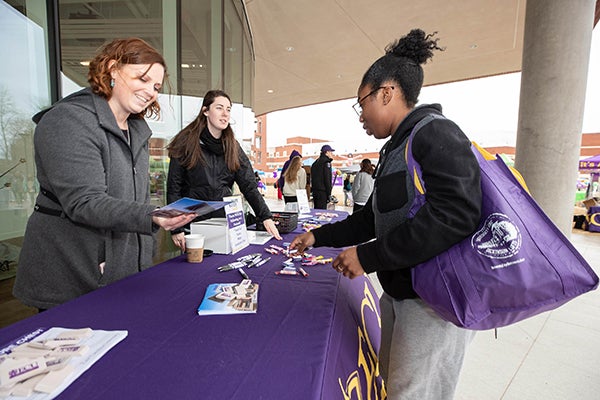
Lauren Thorn, left, greets a student at a table outside the Main Campus Student Center last year. (Photo taken pre-COVID-19 by Rhett Butler)
It started with organizing ECU’s Call Center and continued with email responses to concerned parents and students. She helped with videos for virtual orientation and the creation of the plan for student isolation should they experience COVID-19 symptoms.
“I think part of the professional challenge is having to expedite processes on campus that typically would take us months to put in place,” Thorn said. “Many of our regulations, policies, standard operating procedures — we’ve written so much in a short amount of time and had to work collaboratively to make sure that the university has the structure in place to support our students, faculty and staff coming back safely.”
As an advisor for the Students’ Treasure Chest, Thorn helped with the distribution of $8.8 million in CARES Act funding to students, donations to the Student Emergency Fund and $500,000 in institutional and foundation funds that went to students. She said administrators reviewed almost 6,000 applications for help.
“It’s a humbling moment to read what our students have gone through and how COVID-19 has impacted them as we also try to help them progress with their education at ECU,” she said.
But she’s also seen the resiliency in students and staff.
“I love this campus and the ECU community,” Thorn said. “I’m a two-time alum from our School of Social Work and am so proud of how Pirate Nation has adapted.”

Brenda Hopkins wipes down a door in Gateway East Residence Hall. The housekeeping staff sanitized all residence halls before students arrived for the fall semester. (Photo by Cliff Hollis)
